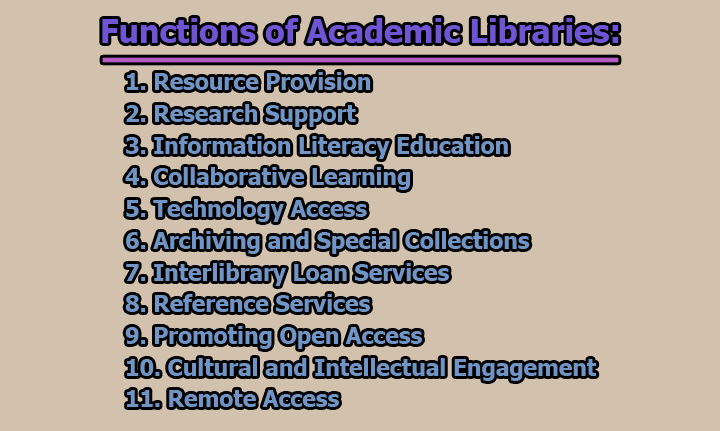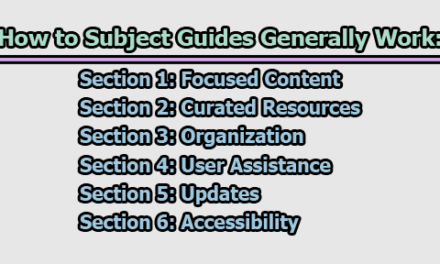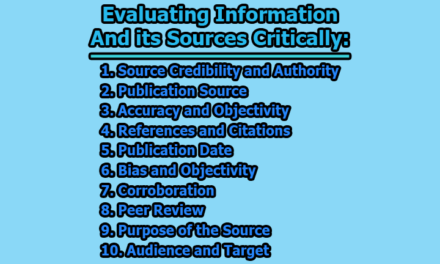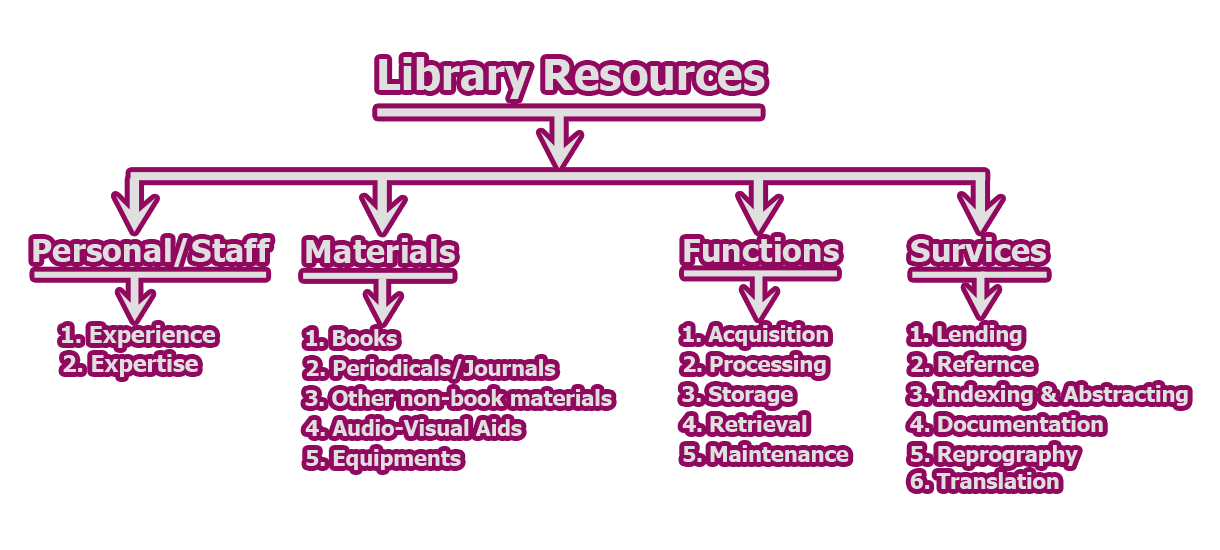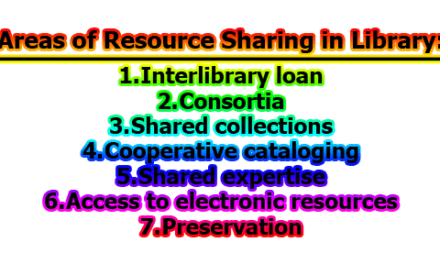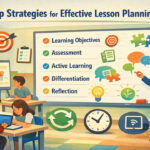An academic library is a specialized repository of knowledge within educational institutions, tailored to meet the specific needs of students, faculty, and researchers. It goes beyond being a mere collection of books; it serves as a dynamic hub supporting diverse academic pursuits and fostering critical thinking, research excellence, and collaborative learning. In the rest of this article, we will explore the types and functions of academic libraries.
What is an Academic Library?
An academic library is a specialized repository of knowledge and information within educational institutions, primarily universities, colleges, and research centers. Unlike public libraries, academic libraries are tailored to meet the specific needs of students, faculty, researchers, and other members of the academic community. Serving as dynamic and indispensable hubs, academic libraries provide access to a diverse range of scholarly resources, including books, journals, electronic databases, and multimedia materials. These carefully curated collections support the educational mission of their institutions by facilitating teaching, learning, and scholarly research. Beyond their role as repositories, academic libraries serve as spaces for intellectual engagement and collaboration, offering conducive environments for study, research, and group discussions. Librarians, experts in information retrieval, play a pivotal role in guiding patrons, helping them locate relevant resources, refine research strategies, and navigate the complexities of the ever-evolving information landscape. As gateways to information, academic libraries bridge the gap between tradition and innovation, playing a critical role in shaping the educational landscape of institutions worldwide.
Types of Academic Libraries:
Different types of academic libraries cater to specific educational institutions, each playing a unique role in supporting academic endeavors.
1. University Libraries: University libraries, integral to higher education institutions, house diverse collections and provide essential services. They promote information literacy, offer collaborative spaces, and host workshops to enhance research skills. Embracing technology, university libraries have shifted to digitization, offering electronic resources for remote access and distance learning.
2. College Libraries: College libraries support specific curricula, providing resources aligned with courses and majors. They contribute to developing students’ research skills and critical thinking abilities, offering various study spaces that integrate digital resources into the learning environment.
3. School Libraries: School libraries foster a love for reading and literacy, promoting information literacy skills. They offer welcoming spaces supporting various learning styles, encouraging students to work together, share ideas, and engage in independent research.
4. Research Institutions Libraries: Research institution libraries emphasize supporting advanced academic and scientific research. They curate extensive collections, collaborate with researchers, and provide spaces for interdisciplinary dialogue. Embracing technology, they offer digital initiatives and promote open-access initiatives to advance science and scholarship.
Functions of Academic Libraries:
Academic libraries are dynamic institutions that extend far beyond being repositories of books. They play multifaceted roles that collectively contribute to the educational and research mission of academic institutions. Here, we explore the essential functions of academic libraries:
- Resource Provision:
- Extensive Collections: Academic libraries curate and maintain extensive collections of books, journals, periodicals, research papers, electronic databases, and multimedia resources. These materials cover various disciplines, ensuring that students, faculty, and researchers have access to comprehensive and up-to-date information relevant to their studies and research projects.
- Diverse Formats: Libraries provide resources in diverse formats, adapting to the changing needs of users. From traditional print materials to electronic resources such as e-books, online journals, and multimedia materials, academic libraries offer a wide range of formats to cater to different learning preferences.
- Research Support:
- Guidance from Librarians: Librarians in academic libraries collaborate with researchers to help them identify and access relevant sources for their research. They guide users in using specialized databases, formulating effective search queries, and navigating academic literature to ensure comprehensive and credible research.
- Access to Hard-to-Find Materials: Librarians assist researchers in locating hard-to-find materials, ensuring that research is grounded in a solid foundation of reliable and scholarly sources.
- Information Literacy Education:
- Workshops and Instructional Sessions: Academic libraries offer workshops and instructional sessions to enhance users’ information literacy skills. These sessions teach students to evaluate sources critically, differentiate between reliable and unreliable information, and ethically use and cite sources in their academic work.
- Lifelong Skills: Information literacy education equips students with lifelong skills for evaluating information in an increasingly digital and complex information landscape. Librarians empower users to navigate the complexities of the information age with confidence.
- Collaborative Learning:
- Spaces for Collaboration: Academic libraries create spaces that encourage collaborative learning and group work. Group study rooms equipped with multimedia tools, discussion areas, and technology resources enable students to collaborate on projects, engage in peer discussions, and jointly tackle academic challenges.
- Interdisciplinary Exchange: These collaborative spaces foster interdisciplinary exchange among students, faculty, and researchers, promoting a rich academic environment.
- Technology Access:
- Computers, Printers, and Scanners: Libraries provide access to computers, printers, scanners, and software that support academic and research activities. This ensures that users have the necessary technological tools to enhance their learning and research experiences.
- Assistance from Librarians: Librarians assist users in using digital tools effectively, such as conducting online research, managing references, and creating multimedia presentations. They play a role in ensuring that users leverage technology to its fullest potential for academic success.
- Archiving and Special Collections: Many academic libraries house unique and rare materials with historical, cultural, and scholarly significance. Archivists and librarians curate these special collections, making them available for research and study. These collections can include manuscripts, letters, photographs, rare books, and artifacts, offering a window into the past and enabling in-depth research in specialized fields.
- Interlibrary Loan Services: Academic libraries collaborate with other institutions to provide interlibrary loan services. Users can request materials not available in their own library and have them borrowed from other libraries, expanding the breadth of accessible resources. This enhances the depth and diversity of available materials for academic pursuits.
- Reference Services:
- Personalized Assistance: Librarians offer personalized assistance to users seeking information. They help users navigate library catalogs, databases, and resources, guiding them toward relevant materials that match their research needs.
- Research Guidance: Librarians provide advice on refining research questions, developing search strategies, and critically evaluating sources. They serve as valuable resources in the research process, contributing to the overall success of academic endeavors.
- Promoting Open Access:
- Advocating for Open Access: Many academic libraries advocate for open access, promoting unrestricted access to scholarly research. Librarians encourage researchers to publish their work in open-access journals or repositories, making their findings accessible to a global audience without subscription barriers.
- Facilitating Knowledge Sharing: Promoting open access initiatives contributes to the broader dissemination of knowledge, fostering collaboration and innovation within the academic community.
- Cultural and Intellectual Engagement:
- Events and Exhibitions: Libraries host events, exhibitions, author talks, and lectures that promote intellectual engagement and cultural exploration. These activities enrich the academic community by fostering discussions, encouraging interdisciplinary connections, and celebrating the arts and sciences.
- Community Building: Cultural and intellectual engagement initiatives create a sense of community within the academic environment, encouraging students and faculty to participate in a shared scholarly experience.
- Remote Access:
- Digital Platforms: Through digital platforms, academic libraries provide remote access to their electronic resources. This enables users to access materials from off-campus locations, facilitating continuous learning and research regardless of physical proximity to the library.
- Adapting to Changing Needs: Remote access options cater to the evolving needs of users, allowing them to stay connected with academic resources and support services even in situations where physical access may be limited.
In conclusion, academic libraries are dynamic centers of knowledge, fostering an environment of learning, research, and collaboration. Their multifaceted functions contribute significantly to the academic growth, intellectual development, and scholarly advancement of the institutions and communities they serve. As technology continues to shape education, academic libraries remain at the forefront, adapting and evolving to meet the changing needs of the academic community.
Frequently Asked Questions (FAQs):
What resources are typically found in academic libraries?
Academic libraries house a diverse range of resources, including books, journals, periodicals, research papers, electronic databases, and multimedia materials, supporting teaching, learning, and scholarly research.
How do academic libraries differ from public libraries?
Academic libraries are tailored to the needs of the academic community within educational institutions, while public libraries serve a broader audience. Academic libraries focus on supporting scholarly pursuits and research.
What types of academic libraries exist?
Common types include university libraries, college libraries, school libraries, and research institution libraries, each serving specific educational levels and research focuses.
What services do academic libraries provide?
Academic libraries offer various services, including resource provision, research support, information literacy education, collaborative learning spaces, technology access, archiving special collections, interlibrary loan services, and cultural engagement events.
How do academic libraries contribute to research endeavors?
They provide access to a wide range of scholarly materials, collaborate with researchers on resource identification, offer guidance on using databases, and support information literacy skills essential for rigorous research.
What role do librarians play in academic libraries?
Librarians, experts in information retrieval, guide patrons in locating resources, refining research strategies, and using library tools effectively. They also contribute to information literacy education and assist in navigating the complexities of the information landscape.
How have academic libraries embraced technology?
Academic libraries have integrated technology by offering electronic resources such as e-books, online journals, and digital archives. Many libraries also provide remote access options, supporting distance learning and research.
What is the significance of archiving and special collections in academic libraries?
Archiving preserves cultural heritage, and special collections house rare materials crucial for in-depth research. These collections can include manuscripts, letters, photographs, rare books, and artifacts.
How do academic libraries promote open access?
Many libraries advocate for open access, encouraging researchers to publish in open-access journals or repositories, making their findings accessible globally without subscription barriers.
What events and activities do academic libraries host?
Libraries host events, exhibitions, author talks, and lectures that promote intellectual engagement and cultural exploration, fostering a sense of community within the academic environment.
Can I access academic library resources remotely?
Yes, academic libraries often provide remote access to electronic resources, allowing users to access materials from off-campus locations, facilitating continuous learning and research.

Library Lecturer at Nurul Amin Degree College

